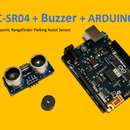Introduction: Billy the Biped Robot - 3D Printed
This is Billy, a cute little Bipedal Robot born from an Ultimaker 3D Printer, designed with Fusion 360. He can walk, he can dance, and he can avoid objects! All powered from an Arduino and 4 Servo Motors!
Step 1: 3D Print
I have attached the 3D printed parts designed with Autodesk's Fusion360. 3D print one copy of each component except for the leg -- "servo holder.stl." You will need to print two copies. As you can see I forgot to send the instruction to print two copies of it which is why Billy has two different coloured legs.
Step 2: Mount Arduino
Mount the Arduino onto the top the head with two screws.
Step 3: Mount and Wire Ultrasonic
* Mount the Ultrasonic Sensor onto the two large holes on the head. This component is a friction fit component so you have to apply quite a bit of force to fit it in properly especially due to 3D printing shrinkage.
* Connect the Trig pin to pin 11 on the Arduino.
* Connect the Echo pin to pin 12 on the Arduino.
Step 4: Mount Feet Servo
* Centre the servo motor powering it anywhere from 5V to 7.2V. I used a 6V battery pack.
* Glue the servo motor the foot aligning the notches to the notch on the 3d printer arm.
* Repeat this for both feet.
Step 5: Attach Legs
* Align the holes on the back of the foot.
* Then, glue or screw the servo onto the foot.
Step 6: Make a Leg Axle
I could not find a small enough rod to use as the axle for the side-to-side motion the foot. Thus, I used some old pens lying around.
* Cut off one end of the pen and push it through the hole and cut off the excess.
* Apply a large bead of hot glue on either ends of the pen axle so that the axle does not slip off.
Step 7: Mount the Leg Servos
This is the second pair of servo motors that attach the torso to the feet of the robot, so I called them leg servos.
* Use the cross patterned servo horn and place it on the opposite side of the servo motor with the 3d printed base piece sandwiched in the middle.
* Screw in the servo horn onto the the servo.
* Further secure it by applying hot glue from the servo to the base plate.
Step 8: Wiring
Follow the table bellow for a concise wiring guide for Billy the Biped.
* Servo L1 refers to the servo motor on the left foot.
* Servo L2 refers to the servo motor on the left leg.
* Servo R1 refers to the servo motor on the right foot.
* Servo R2 refers to the servo motor on the right leg.
| I/O | I/O Pin | Arduino Pin | Breadboard Pin |
|---|---|---|---|
| Servo L1 | Brown | Ground Rail | |
| Red | 5V | Power Rail | |
| Orange | 3 | ||
| Servo L2 | Brown | Ground Rail | |
| Red | Power Rail | ||
| Orange | 6 | ||
| Servo R1 | Brown | Ground Rail | |
| Red | Power Rail | ||
| Orange | 9 | ||
| Servo R2 | Brown | Ground Rail | |
| Red | Power Rail | ||
| Orange | 10 | ||
| Ultrasonic | VCC | 3.3V | |
| Trigger | 11 | ||
| Echo | 12 | ||
| GND | GND | Ground Rail |
Step 9: Code
This type of configuration is quite common for biped robots, as such there are countless Arduino codes on GitHub such as: https://github.com/OttoDIY/DIY
For this project here's a demo code to test out all the servos:
#include <Servo.h> <br>Servo left1;
Servo left2;
Servo right1;
Servo right2;void setup()
{ left1.attach(3)
right1.attach(6)
left2.attach(9);
right2.attach(10);
}void loop()
{
left1.write(0);
left2.write(0);
right1.write(90);
right2,write(90);
delay(100);
left1.write(90);
left2.write(45);
right1.write(45);
delay(100);
left1.write(0);
left2.write(0);
right1.write(90);
right2,write(90);
delay(100);
left1.write(0);
left2.write(45);
right1.write(45);
right2.write(0)
delay(100);
left1.write(30);
left2.write(10);
right1.write(30);
right2,write(10);
delay(100);
left1.write(0);
left2.write(0);
right1.write(0);
rigt2.write(0;
delay(100);
}Step 10: Enjoy!
Enjoy your cute little Billy the Biped!

Participated in the
Makerspace Contest 2017

Participated in the
Plastics Contest
















